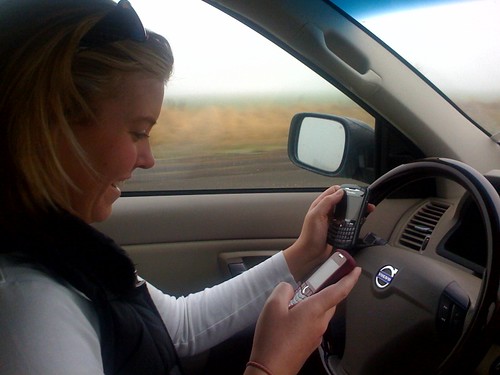
Recently the New York Times has run several powerful articles underscoring the dangers of driving distracted, something which I don’t think can be emphasized enough.
When I first got a cell phone a little over a year ago, my home state of New Jersey had just made one of the country’s first hands-free cell phone laws. I thought this was great and eagerly purchased a bluetooth headset for use with my phone and left it at that.
Even so, I tried to avoid talking while driving unless I was on a long-haul highway trip, in which case the phone helped snap me out of highway hypnosis every now and again. However, I began to notice that fuel economy would always take a hit when I was on the phone.
Why? I was distracted. I didn’t think I was being particularly unsafe; I never drifted out of my lane, missed an exit, or had a close call. But, I was clearly distracted.
On top of this I had to follow a friend through city traffic recently. Because of the dense traffic we happened to get separated several times, in which case we called each other on the phone to reestablish our link. The phone, I found, was very distracting. Talking to my friend about where he was in traffic made it even harder to figure out where he was in the sea of cars ahead of me.
And I got terrible mileage.
So here’s a thought: if you can’t put down the phone because it’s not safe (even hands-free is unsafe and I have completely stopped answering when I get calls), remember that every minute spent on the phone will have a negative impact on your fuel economy.
Image: Ryan Harvey
Popularity: 3% [?]




{ 2 comments }
Which is exactly the reason we need robocars.
Or at least cars that know how to adjust the gas pedal for us.
And smarter cruise control.
I’ve always found it difficult and tiring to DWL (Drive With Load?).
Randy
I wonder what the current day possibilities for smarter cruise control are. In aviation, autopilot and autothrust together do almost all of the flying. There they have the advantage of low aircraft density, freedom from obstacles and carefully planned out routes. The aviation world also has Air Traffic Control to monitor and coordinate everything. Probably smart cruise control will need an environment that simulates these factors. For example building special obstacle free roadways that are more like train rails and having a central control computer monitor everything. This would take away so much individual control from driving that maybe it would be better to just replace all cars with little roller-coaster style trains. Or we can wait for artificial intelligence. “Dave, I cannot let you turn left now.”
Comments on this entry are closed.